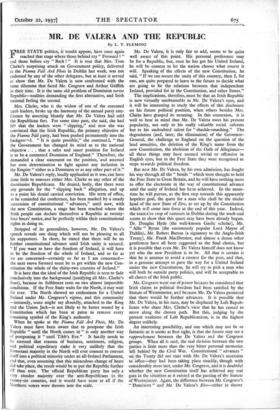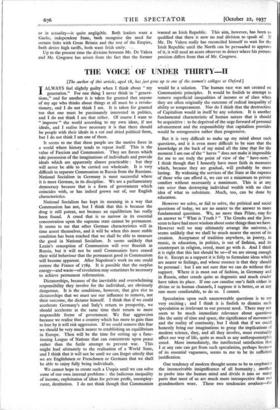MR. DE VALERA AND THE REPUBLIC
By L. T. FLEMING
FREE STATE politics, it would appear, have once again reached that stage where those behind cry " Forward ! " and those before cry " Back ! " It is true that Mrs. Tom Clarke's surprising attack on Government policy, delivered at the Fianna Fdil Ard Fheis in Dublin last week, was not endorsed by any of the other delegates, but at least it served to show that Mr. De Valera is now confronted with the same dilemma that faced Mr. Cosgrave and Arthur Griffith in their time. It is the same old problem of Dominion versus Republic—realities demanding the first alternative, and Irish national feeling the second.
Mrs. Clarke, who is the widow of one of the executed 1916 leaders, broke up the harmony of the annual party con- ference by asserting bluntly that Mr. De Valera had sold the Republican fort. For some time past, she said, she had felt that the leaders were " slipping," and now she was convinced that the Irish Republic, the primary objective of the Fianna Fdil party, had been pushed permanently into the backgrov"d. " It is quite possible," she continued, " that the Government has changed its mind as to the national objective . . . that a safer and saner position for Ireland is to be a contented Dominion of England." Therefore, she demanded a clear statement on the position, and asserted her own determination to fight against any inclusion in the Empire " either as a Dominion or as any other part of it."
Mr. De Valera's reply, loudly applauded as it was, can have done little to reassure either Mrs. Clarke or any other of the doctrinaire Republicans. He denied, hotly, that there were any grounds for the " slipping back " allegation, and up to a point his denial carried conviction. His term of office, as he reminded the conference, has been marked by a steady succession of constitutional " advances," until now, with the new Constitution, a stage has been reached where the Irish people can declare themselves a Republic at twenty- four hours' notice, and be perfectly within their constitutional rights in doing so.
Stripped of its generalities, however, Mr. De Valera's speech reveals one thing which will not be pleasing to all his supporters. In short, he stated that there will be no further constitutional advance until Irish unity is secured. " If you want to have the freedom of Ireland, it will have to be the freedom of the whole of Ireland, and so far as we are concerned—certainly so far as I am concerned— the next move forward must be to get within the new Con- stitution the whole of the thirty-two counties of Ireland."
It is here that the ideal of the Irish Republic is seen to fade conclusively into the background (justifying all Mrs. Clarke's fears), because its fulfilment rests on two almost impossible conditions. If the Free State waits for the North, it may wait for ever. The North showed no enthusiasm for a United Ireland under Mr. Cosgrave's regime, and this community —intensely, some might say absurdly, attached to the King and the Union Jack—is not likely to be better wooed by a Constitution which has been at pains to remove every remaining symbol of the King's authority.
When he spoke at the Fianna Fdil Ard Fheis, Mr. De Valera must have been aware that to postpone the Irish Republic " until the North comes in " is only another way of postponing it " until Tibb's Eve." It hardly needs to be stressed that reasons of business, sentiment, religion, and political expediency make it very unlikely that the Protestant majority in the North will ever consent to convert itself into a political minority under an all-Ireland Parliament, and that, even assuming that this miraculous change of heart did take place, the result would be to put the Republic further off than ever. The official Republican party has only a very slender majority over the anti-Republicans in the twenty-six counties, and it would have none at all if the Northern voters were thrown into the scale. Mr. De Valera, it is only fair to add, seems to be quite well aware of this point. His personal preference may be for a Republic, but, once he has got his United Ireland, he will be content to let the nation choose what course it will. Speaking of the effects of the new Constitution, he said, " If we can secure the unity of this country, then I, for one, am quite prepared to leave to the future to decide what are going to be the relations between that independent Ireland, provided for in the Constitution, and other States."
The implications, therefore, must be that an Irish Republic is now virtually unobtainable in Mr. De Valera's eyes, and it will be interesting to study the effects of this disclosure on his future political position, when others besides Mrs. Clarke have grasped its meaning. In this connexion, it is well to bear in mind. that Mr. De Valera owes his present popularity, not only to his really valuable social reforms but to his undoubted talent for " shackle-smashing." The degradation (and, later, the elimination) of the Governor- General, the challenge to England on the question of the land annuities, the deletion of the King's name from the new Constitution, the abolition of the Oath of Allegiance— all these things may have seemed trivial or offensive in English eyes, but in the Free State they were recognised as steps to wards political freedom.
But now Mr. De Valera, by his own admission, has fought his way through all the " bonds " which were thought to hold the Free State to Great Britain, and he will have nothing more to offer the electorate in the way of constitutional advance until the unity of Ireland has been achieved. In the mean- time he will pursue, as the first step towards this apparently hopeless goal, the quest for a man who shall be the titular head of the new State of Eire, as set up by the Constitution which will come into force at the end of this year. Indeed, the extensive crop of rumours in Dublin during the week-end seems to show that this quest may have been already begun. Dr. Douglas Hyde (the well-known Gaelic scholar), Mr. " Alfie " Byrne (the enormously popular Lord Mayor of Dublin), Mr. Robert Barton (a signatory to the Anglo-Irish Treaty), Mr. Frank MacDermot, and almost a dozen other gentlemen have all been suggested as the final choice, but it is possible that even Mr. De Valera himself does not know yet who the new President is to be. All that is certain is that he is anxious to avoid a contest for the post, and that, in a genuine attempt to pave the way for a United Ireland under the new Constitution, he will try to pick a man who will both be outside party politics, and will be acceptable to all classes of the Irish public.
Mr. Cosgrave went out of power because he considered that Irish claims to political freedom had been satisfied by the Statute of Westminster, and because Mr. De Valera promised that there would be further advances. It is possible that Mr. De Valera, in his turn, may be displaced by Left Repub- licans who share Mrs. Clarke's view that he has ceased to move along the chosen path. But this, judging by the present weakness of Left Republicanism, is in the highest degree unlikely.
An interesting possibility, and one which may not be so fantastic as it seems at first sight, is that the future may see a rapprochement between the De Valera and the Cosgrave groups. When all is said, the real division between the two parties is little more than the very bitter personal memories left behind by the Civil War. Constitutional " advances " on the Treaty did not start with Mr. De Valera's accession to Office—they had been taking place steadily, though with considerably more tact, under Mr. Cosgrave, and it is doubtful whether the new Constitution itself has achieved any real gain in the -situation as it existed at the passing of the Statute of Westminster. Again, the difference between Mr. Cosgrave's " Dominion " and Mr.- De Valera's Eire—either in theory or in actuality—is quite negligible. Both leaders want a independent State, both recognise the need for certain links with Great Britain and the rest of the Empire, both desire high tariffs, both want Irish unity. . .
Up to the present time the division between Mr. De Valera and Mr. Cosgrave has arisen from the fact that the former Wanted an Irish Republic. This aim, however, has been so qualified that there is now no real division to speak of. If Mr. De Valera really has reconciled himself to wait for the Irish Republic until the North can be persuaded to approve of it, it will need an acute observer to detect where his present position differs from that of Mr. Cosgrave.































































 Previous page
Previous page